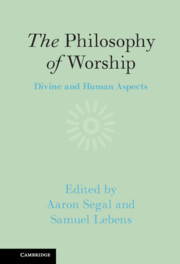Book contents
- The Philosophy of Worship
- The Philosophy of Worship
- Copyright page
- Contents
- Contributors
- Part I Two Introductions
- Part II What Is Worship?
- Part III Normative Aspects
- Part IV Forms and Functions of Worship
- 13 Liturgical Philosophy of Religion
- 14 Maimonides on Worship, True and False
- 15 The Individual’s Relationship with God
- 16 The Metaphysics of Divine Presence and the Appropriateness of Worship
- Index
- References
15 - The Individual’s Relationship with God
An Existentialist Understanding
from Part IV - Forms and Functions of Worship
Published online by Cambridge University Press: 09 January 2025
- The Philosophy of Worship
- The Philosophy of Worship
- Copyright page
- Contents
- Contributors
- Part I Two Introductions
- Part II What Is Worship?
- Part III Normative Aspects
- Part IV Forms and Functions of Worship
- 13 Liturgical Philosophy of Religion
- 14 Maimonides on Worship, True and False
- 15 The Individual’s Relationship with God
- 16 The Metaphysics of Divine Presence and the Appropriateness of Worship
- Index
- References
Summary
Does the conception of worship – in expressing, as it does, a direct relationship with God – prevent an understanding of love for God as mediated by love for humans? Taking the latter to be an existential model of one’s relationship with God, in this chapter I answer in the negative to the above question by demonstrating the role that worship plays in such a model. To do so, I turn to Kierkegaard’s image of “resting transparently” in God. For Kierkegaard, this image represents what he perceives as the highest possible state of the believer’s relationship with God; a state that is achieved, according to Kierkegaard, when one becomes the self – the individual – that God intends one to be. And how does one become this self? By loving properly the neighbour (that is, another individual). The suggestion I develop in this chapter is that it is the worshipping of God – that is, by being in a state of respect and attendance to God’s will – that directs one in loving properly the neighbour. Hence, it is worship of God that paves the way to fully loving the neighbour and thus to fully loving God.
- Type
- Chapter
- Information
- The Philosophy of WorshipDivine and Human Aspects, pp. 278 - 295Publisher: Cambridge University PressPrint publication year: 2025

